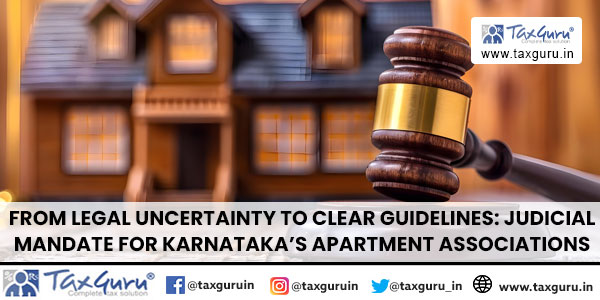From Legal Uncertainty to Clear Guidelines: The Judicial Mandate for Karnataka’s Apartment Associations
Introduction: For the past few years, Karnataka, and especially Bengaluru, has been embroiled in various schools of thoughts and confusions surrounding the statute governing associations of allottees in apartments and its management. The lack of clarity surrounding the proper legal framework for apartment owners associations’ registration is the root of this confusion. This blog post will explore the legal framework governing the registration of these associations, the ambiguity that caused many associations to register under incorrect statutes, and the most recent court rulings on this subject.
Understanding the Law:
1. The Karnataka Societies Registration Act, 1960 (KSRA): The KSRA primarily governs the registration of literary, scientific, charitable, and other organizations. However, some apartment owner associations were mistakenly registered under this Act, despite the fact that it was intended for a different purpose. In fact, on November 30, 2018, the Registrar of Co-operative Societies explicitly stated that apartment owners’ associations should not be registered under the KSRA.

2. The Karnataka Co-operative Societies Act, 1959 (KCSA): This Act governs the establishment and operation of cooperative societies in Karnataka. Apartment owners’ associations registered with the KCSA have the status of a body corporate, which gives them legal recognition, the ability to hold property, enter into contracts, and participate in legal proceedings.
3. The Karnataka Ownership Flats Act, 1972: Section 10 of The Karnataka Ownership Flats Act, 1972 allows apartment owners associations to register either as a co-operative society or a company. A company registered under the Companies Act becomes a body corporate, which allows it to own property and legally represent its members.
The Legal Confusion: The confusion stems from uncertainty about the appropriate legal framework for apartment owners associations. Many associations chose to register under the KSRA, unaware that it was not appropriate for their needs. As a result, they lacked the legal status and authority required to effectively manage and maintain the properties.
Case Studies
Here’s a look at how the jurisprudence surrounding the issue has evolved through key decisions.
Case 1: VDB Celadon Apartment Owners Association v. State of Karnataka
In 2019, a group of apartment owners from the VDB Celadon Housing Complex in Bangalore went to court to challenge the registration of their apartment owners’ association under the Karnataka Societies Registration Act of 1960. Given the Karnataka Apartment Ownership Act of 1972’s specific provisions governing apartment complexes, the petitioners contended that the association should have been registered under it.
Under the direction of Justice Alok Aradhe, the Hon’ble High Court of Karnataka examined the complexities of the case. It agreed with the petitioners that registration should have been under the Karnataka Apartment Ownership Act, 1972, which supersedes the general provisions of the Societies Act, because the association was made up of owners of flats within an apartment complex. As a result, the court invalidated the Societies Act registration, giving the association the freedom to apply for registration under the appropriate statute.
The VDB Celadon Apartment Owners Association filed an appeal against individual flat owners and state officials on November 6, 2019, before the High Court of Karnataka in Bengaluru, presided over by Hon’ble Chief Justice Abhay S. Oka and Hon’ble Mr. Justice S.R. Krishna Kumar. The court determined that the residential complex should be governed by the Act of 1972 and canceled the Association’s registration under the Act of 1960, emphasizing the legal requirement for appropriate legislative governance of residential apartment complexes without commercial units.
Case 2: Chitramala Land and Flat Owners Welfare Association v. Government of Karnataka
In the year 2021, the Chitramala Land and Flat Owners Welfare Association experiences a comparable story. Arguing that the rival association should have been registered under the Karnataka Apartment Ownership Act, 1972, the petitioner, who was registered under the Karnataka Societies Registration Act, 1960, requested the cancellation of the rival association’s registration.
Reiterating the arguments of the previous case, the court stressed that managing, maintaining, and operating houses and apartments is not within the Societies Act’s jurisdiction. It emphasized how important it is that associations created around apartment buildings follow the terms of the Apartment Ownership Act. In accordance with earlier rulings, the court thus invalidated the association’s registration under the Societies Act.
Case No. 3: The 2024 Judgment: DS-Max Star Nest Case
On February 23, 2024, the High Court of Karnataka in Bengaluru, presided over by Hon’ble Mr. Justice Anant Ramanath Hegde, heard a case involving multiple flat owners of DS-Max Star Nest Apartments against the State of Karnataka, the Registrar Karnataka Co-operative Societies, DS-Max Properties Pvt. Ltd., and the proposed Starnest Apartment Owners Co-operative Society Ltd. The petitioners sought to prevent the registration of a Co-operative Society to manage their apartments, arguing instead for the formation of an association under the Karnataka Apartment Ownership Act of 1972. The court ruled that the property must be governed by the Act of 1972, not the Karnataka Co-operative Societies Act of 1959, and ordered the builder to assist in forming the necessary association, rescinding the permission to form the Cooperative Society.
Judicial Clarifications:
These cases support the judicial conclusion that residential apartment complexes in Karnataka should be governed and managed under the Karnataka Apartment Ownership Act, 1972, rather than the Karnataka Co-operative Societies Act, 1959. This clarification seeks to ensure uniformity and proper management of apartment complexes, as the 1972 Act is specifically designed for this purpose, whereas the 1959 Act is intended for larger cooperative society formations that may not adequately address the unique requirements of residential apartment governance.




